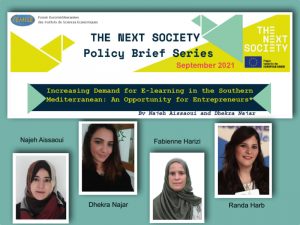 Micro, small and medium enterprises (MSMEs) constitute about 95% of total enterprises in the South Med region and are considered the driving forces of economic growth, job creation and green and inclusive growth. Entrepreneurs, particularity start-ups, still face numerous challenges when it comes to establishing, promoting and running their businesses. Providing them with support through innovative initiatives and enhancing the ecosystem where they operate will contribute to their development. In their turn, entrepreneurs will contribute to achieving several of the Sustainable Development Goals (SDGs).
Micro, small and medium enterprises (MSMEs) constitute about 95% of total enterprises in the South Med region and are considered the driving forces of economic growth, job creation and green and inclusive growth. Entrepreneurs, particularity start-ups, still face numerous challenges when it comes to establishing, promoting and running their businesses. Providing them with support through innovative initiatives and enhancing the ecosystem where they operate will contribute to their development. In their turn, entrepreneurs will contribute to achieving several of the Sustainable Development Goals (SDGs).
It is in this context that the Next Society (TNS) project and FEMISE decided to launch this initiative to produce “The Next Society Policy Briefs Series”. This series of briefs aims to better understand the challenges faced by entrepreneurs (through the lens of the entrepreneurs themselves) and to provide tailor-made operational policy recommendations. These briefs are based on collaborative work and exchange of knowledge and experience between the researcher(s)/author(s) and the entrepreneur(s), many of which have benefited from TNS project, ensuring their relevance and impact.
The third TNS/ FEMISE Policy Brief, entitled “Increasing Demand for E-learning in the Southern Mediterranean: An Opportunity for Entrepreneurs” by Najeh Aissaoui, University of Carthage, and Dhekra Najar, University of Manouba, is available here
 Summary:
Summary:
E-Learning is one of the biggest revolutions in the education sector that has reshaped the learning process. Today, the global e-learning market is growing exponentially and is estimated to reach 370 billion US$ by 2026, up from 226 billion US$ in 2020 (this includes the academia, government and corporate sectors). The health crisis has changed the way education systems work across the world. In the Southern Med region, the transition to e-learning ensuring pedagogical continuity during periods of confinement have shown the fragility and the unpreparedness of the education system in these countries. Gaps are mainly related to weaknesses in supply and demand for e-learning, in addition to institutional, financial and infrastructural challenges. Therefore, reform strategies and action plans are needed to enable these countries to catch-up with this growing trend.
The present policy brief aims at helping promote the e-learning sector in the region by first, providing an overview of the sector and identifying some of the main challenges that this sector is facing in the South Med region. The brief then highlights the success story of two entrepreneurs that have created their own e-learning start-ups in an attempt to contribute in finding solutions to problems that exist in their communities. These entrepreneurs who took part in the Next Society project (TNS) that is funded by the European Commission, have participated in a questionnaire that gathered information about their motivations, challenges and recommendations. The policy brief concludes with some operational recommendations based on the analysis.
In a nutshell, these entrepreneurs have exhibited the significant obstacles that are holding back the expansion and development of the e-learning industry in the region. These obstacles are: institutional, financial, finding partnerships, culture & commercialization, and access to infrastructure. Some practical policy recommendations are drawn from their experiences, which could contribute to unlock the potentials of the e-learning systems in the South-Med countries, especially after the Covid-19 crisis constraints. These recommendations include the necessity : to modernize, streamline and simplify administrative procedures, to carry out legislative reforms, to improve access to finance, to put into practice alternative tools to stimulate the creation, to promote national and international partnership, and to invest in young people which leads to changing mentalities and prejudices about e-learning and developing skills.
Watch this video by the author and the entrepreneurs sharing their experience, highlighting the challenges and providing recommendations and lessons learnt.
`*This Policy Brief is produced as part of the series of TNS/FEMISE Policy Briefs on “Entrepreneurship in South Mediterranean Countries” that is undertaken in partnership between FEMISE and ANIMA Investment Network.
![]() *”This policy brief has been produced with the financial support of the European Union. The contents of this brief are the sole responsibility of the authors and can under no circumstances be regarded as reflecting the position of the European Union.”
*”This policy brief has been produced with the financial support of the European Union. The contents of this brief are the sole responsibility of the authors and can under no circumstances be regarded as reflecting the position of the European Union.”


